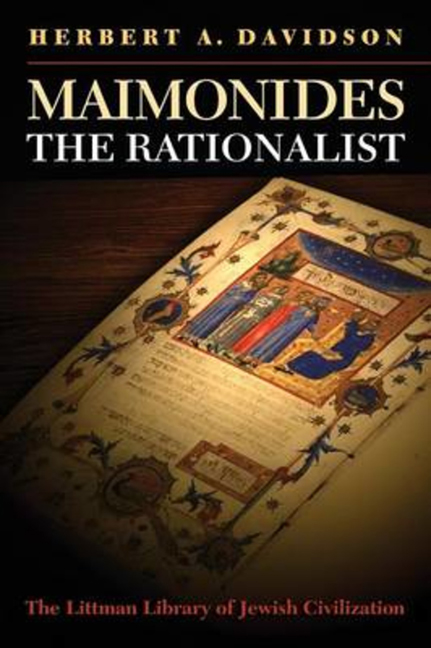Book contents
- Frontmatter
- Dedication
- Preface and Acknowledgements
- Contents
- Publisher's Note on Transliteration
- Abbreviations and Note on Sources
- 1 The Study of Philosophy as a Religious Obligation
- 2 The First Two Positive Divine Commandments
- 3 Maimonides' Knowledge of the Philosophical Literature in his Rabbinic Period
- 4 Maimonides' Shemonah perakim and Alfarabi's Fuṣūl Muntaza'a
- 5 Maimonides' Knowledge of the Philosophical Literature in his Later Period
- 6 Maimonides on Metaphysical Knowledge
- 7 A Problematic Sentence in Moreh nevukhim, ii. 24
- 8 Maimonides' Ethical Systems
- 9 Maimonides the Rationalist
- Works Cited
- Index
9 - Maimonides the Rationalist
- Frontmatter
- Dedication
- Preface and Acknowledgements
- Contents
- Publisher's Note on Transliteration
- Abbreviations and Note on Sources
- 1 The Study of Philosophy as a Religious Obligation
- 2 The First Two Positive Divine Commandments
- 3 Maimonides' Knowledge of the Philosophical Literature in his Rabbinic Period
- 4 Maimonides' Shemonah perakim and Alfarabi's Fuṣūl Muntaza'a
- 5 Maimonides' Knowledge of the Philosophical Literature in his Later Period
- 6 Maimonides on Metaphysical Knowledge
- 7 A Problematic Sentence in Moreh nevukhim, ii. 24
- 8 Maimonides' Ethical Systems
- 9 Maimonides the Rationalist
- Works Cited
- Index
Summary
It is known and clear that love of God establishes itself in man's heart only when he is ravished by it constantly and forsakes everything in the world … except for his knowledge of God. Knowledge and love go hand in hand; when there is less of the first there is less of the second and when there is more, there is more. Consequently, a man should, as far as humanly possible, devote himself to exercising his intellect in mastery of the sciences … that lead to knowledge of God.
MAIMONIDES Mishneh torah, closing lines of ‘Sefer hamada’WE HAVE FOUND THE FOLLOWING.
Maimonides expresses his commitment to the intellectual ideal in rabbinic and philosophical writings that span more than three decades. In the Commentary on the Mishnah, which he completed at the age of 30, he characterizes the sciences of physics and metaphysics as the roots—or principles (aṣl)—on which the legal and ritual part of the Jewish religion rests. Prophets and philosophers, he assures us, agree that everything in the lower world exists for the single purpose of bringing forth men who excel in ‘knowledge and practice’ (‘ilm and ’amal), and knowledge in the present context means the ‘conceiving of the true essences [of things] … and the cognition of everything a man can know’; ’ilm, in other words, has its technical sense of science. ‘The goal of the human species is to conceive intelligible thoughts’ and it is attained by those who are ‘students of science and philosophize’. In a remark that some may find disquieting,Maimonides writes that human beings who are incapable of attaining the intellectual goal exist in order to supply the needs of those who have the capability.
TheMishneh torah,Maimonides’ code of Jewish law, goes further. It teaches that the first two positive commandments of the divine Law are fulfilled by mastering rational demonstrations of the existence and unity of God. Love of God is predicated on knowledge, and ‘a man should, as far as humanly possible, devote himself to exercising his intellect in mastery of the sciences … that lead to knowledge of God’.
- Type
- Chapter
- Information
- Maimonides the Rationalist , pp. 268 - 298Publisher: Liverpool University PressPrint publication year: 2011



